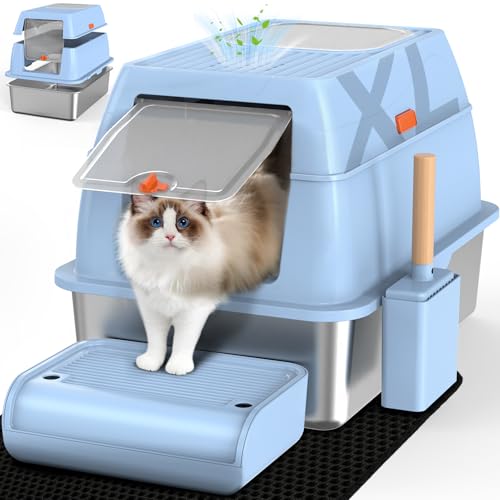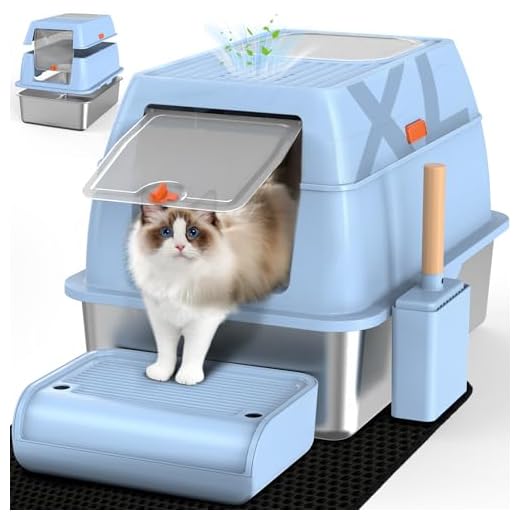








To tackle the fascination some canines have with feline droppings, consider a few key factors. One primary reason stems from the scent; the aroma can intrigue them due to its appealing odour profile. Cats often consume a diet rich in proteins, which can make their faeces particularly enticing to curious noses.
Another aspect to ponder is the instinctive behaviour rooted in scavenging. Many canines are natural foragers, and finding such “treasures” outdoors can trigger their innate desire to explore and consume. This behaviour can be linked to their ancestry, where scavenging was necessary for survival.
To mitigate this habit, ensure your furry friend has plenty of stimulating activities. Regular exercise, engaging toys, and interactive play can redirect their attention away from undesirable items. Additionally, keeping litter boxes out of reach and maintaining a clean yard can help reduce access to these tempting discoveries.
Always monitor your companion after any unsavoury snack. While most instances are harmless, keeping an eye on their health is a good practice. If you notice any unusual symptoms, don’t hesitate to consult a veterinarian for peace of mind.
Understanding the Nutritional Reasons Behind Coprophagia
To address the attraction some canines have towards feline waste, it’s crucial to explore the nutritional elements that may be enticing them. Felines process their food differently, often leaving behind undigested nutrients in their excrement. This could explain why your four-legged friend finds it appetising. High protein content, particularly from meat-based diets, can be a big draw.
Digestive Enzymes and Nutrient Absorption
Many pets struggle to fully absorb nutrients from their meals due to various digestive issues. If your hound isn’t getting the right balance of enzymes or probiotics, they may turn to alternative sources, such as litter box treasures, in search of those elusive nutrients. Regular veterinary check-ups can help identify any underlying digestive problems and ensure a well-rounded diet.
Behavioural Aspects and Dietary Adjustments
Sometimes, a craving for cat droppings can stem from boredom or anxiety. Ensuring your companion has enough physical and mental stimulation can reduce this behaviour. Consider introducing interactive toys or increasing daily exercise. Additionally, reviewing the quality of their diet might help. Opting for high-quality pet food with balanced nutrition can diminish the urge to scavenge for extra nutrients elsewhere.
Identifying Behavioural Triggers for Dogs Eating Cat Faeces
Observe your canine’s environment closely. Boredom often leads to undesirable habits. Ensure daily exercise and mental stimulation. Engage your pet with interactive toys or puzzles to reduce their interest in less appealing snacks.
Monitor stress levels. Anxiety can drive some canines to seek out unusual food sources. Identifying stressors, such as loud noises or changes in routine, can help in addressing this behaviour. Create a calm space for relaxation and consider using calming products if necessary.
Social behaviours can also play a role. If your furry companion witnesses another pet indulging in this habit, they may mimic the action. Training sessions with positive reinforcement can instil good habits while discouraging this behaviour.
Health issues must not be overlooked. Conditions affecting digestion can lead to unusual cravings. Consult a veterinarian to rule out any underlying medical concerns. A proper diet is essential; consider looking into the best dog food for irritable bowel disease to support digestive health.
Lastly, feeding schedule matters. Regular meal times can create a sense of routine, reducing the urge to scavenge. Stick to a consistent feeding plan to help manage their appetite and discourage them from seeking out other sources of food.
Preventing Access to Cat Litter: Practical Solutions
Install a baby gate or pet barrier in doorways leading to the litter area. This simple measure can effectively restrict access and keep curious canines at bay. Make sure the gate is tall enough; some breeds are quite the jumpers.
Strategic Placement of Litter Boxes
Position litter trays in hard-to-reach or hidden spots. Consider placing them in a bathroom, laundry room, or high-up area that a pet cannot access easily. If space allows, try vertical solutions, like shelves, where only felines can leap up.
Utilise Covered Litter Boxes
Invest in covered litter boxes that can deter larger pets. The lid creates a barrier, making it challenging for them to investigate. Ensure that the entrance hole is appropriately sized to allow only your feline companion entry.
Regularly clean and maintain the litter box to reduce the scent that might attract attention. A clean environment is less appealing for unwanted scavengers. Additionally, consider using litter that has less noticeable odour or one that cats prefer–it might lessen the intrigue for other pets.
Health Implications of Canines Consuming Feline Faeces
Monitoring health closely after a furry friend indulges in the waste of another species is crucial. Several potential risks can arise from this behaviour, necessitating vigilance from pet owners.
Common Health Risks
- Parasites: Intestinal parasites such as roundworms or hookworms may be transmitted through contaminated stool. Regular veterinary check-ups and deworming schedules can mitigate these risks.
- Bacterial Infections: Felines can carry bacteria like Salmonella or E. coli. If ingested, these can lead to gastrointestinal issues in canines, presenting as vomiting or diarrhoea.
- Digestive Upset: Sudden dietary changes can lead to upset stomachs. Consuming foreign substances may trigger pancreatitis, a painful condition requiring immediate veterinary attention.
Signs to Watch For
- Vomiting or diarrhoea, especially if persistent.
- Unusual lethargy or lack of energy.
- Changes in appetite or weight loss.
- Excessive thirst or urination.
Should any of these symptoms appear, seeking veterinary advice is paramount. Regular health check-ups and maintaining a clean environment can significantly reduce the likelihood of complications arising from this behaviour.
FAQ:
Why do dogs eat cat poop?
Dogs may eat cat poop due to a variety of reasons. One common explanation is that they are attracted to the smell and taste of the cat’s waste. Cat food often contains higher protein content than many dog foods, making the nutrient-rich feces appealing to dogs. Additionally, some dogs may simply be curious or have a natural instinct to scavenge. It’s also possible that puppies, in particular, are exploring their environment and trying new things, including cat poop.
Is eating cat poop harmful to dogs?
In most cases, eating cat poop is not immediately harmful to dogs, but it can pose certain health risks. Cat feces can contain parasites, such as toxoplasmosis, which can affect dogs and even humans. Additionally, if the cat has been treated with certain medications, those substances may be excreted in their waste and could potentially harm your dog. It’s advisable to monitor your dog’s behaviour and consult a veterinarian if you notice any signs of illness after they have eaten cat poop.
How can I stop my dog from eating cat poop?
To prevent your dog from eating cat poop, there are several strategies you can implement. First, ensure that the cat’s litter box is kept in a location that is inaccessible to your dog. You might consider using a covered litter box or placing it on a high surface. Training your dog with commands such as “leave it” can also be effective. Additionally, providing your dog with plenty of mental and physical stimulation can reduce their scavenging behaviour. Regularly cleaning the litter box can make it less tempting as well.
Are there certain dog breeds more likely to eat cat poop?
While any dog can develop the habit of eating cat poop, some breeds are more prone to scavenging behaviours. Breeds that are naturally more curious or have a strong prey drive may be more likely to engage in this behaviour. For example, terriers and hounds are known for their inquisitive nature, which can lead them to explore cat waste. However, individual personality and upbringing play a significant role, so it’s not solely dependent on breed.
What should I do if my dog eats cat poop regularly?
If your dog has developed a regular habit of eating cat poop, it’s important to take action. Start by addressing the environment: keep the litter box out of reach and clean it frequently. Training your dog with positive reinforcement can help discourage this behaviour. If the problem persists, consult with a veterinarian or a professional dog trainer for tailored advice. They may suggest behavioural modification techniques or check for underlying health issues that could be contributing to the behaviour.
Why do my dogs eat cat poop?
Dogs may eat cat poop for several reasons. One common explanation is that they are attracted to the smell and taste. Cat food is often richer in protein and fat compared to dog food, making it more appealing to some dogs. Additionally, dogs have a natural scavenging instinct, driving them to explore and consume various things they encounter. It’s also worth noting that some dogs may eat faeces out of boredom or anxiety, especially if they are not receiving enough stimulation or exercise. If this behaviour becomes frequent or concerning, it may be a good idea to consult a veterinarian for further guidance.
Is eating cat poop harmful to my dogs?
Yes, eating cat poop can pose health risks to dogs. Cat faeces can contain parasites, bacteria, and viruses that are harmful to dogs. For instance, the parasite Toxoplasma gondii can be present in cat litter, which can lead to serious health issues in dogs if ingested. Additionally, if a cat is infected with intestinal parasites, these can be transmitted to dogs. While many dogs may not experience immediate health problems from eating cat poop, it is still advisable to discourage this behaviour and monitor your dog’s health closely. If you notice any signs of illness, such as vomiting, diarrhoea, or lethargy, consulting a veterinarian is essential.







